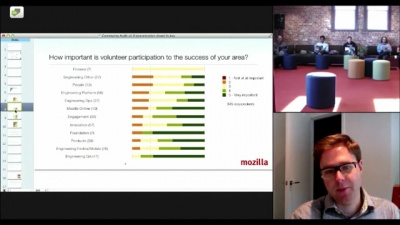The Portland Coincidental Work Week is next week and we’ll be working on our plans for 2015. One of the things we want to include in our planning is Mitchell’s question about what does radical participation look like for Mozilla today?
Everyone who is interested in this question is welcome to join us next Thursday and Friday for the Participation work week. Please come with ideas you have about this question. Here is one idea I’m thinking about that feels like an important part of a radical participation plan.
Slow Down
I’ve worked at small software start-ups and I’ve worked at large volunteer-based organizations. There are many differences between the two. The speed that information reaches everyone is a major difference.
For example, I worked at a small start-up called Alphanumerica. There were a dozen of us all working together in the same small space. Here’s a picture of me in my corner (to give you an idea of how old this photo is it was taken on a digital camera that stored photos on a floppy disk.)

To make sure everyone knew about changes, you could get everyone’s attention and tell them. People could then go back to work and everyone would be on the same page. In this setting, moving fast and breaking things works.
Information doesn’t spread this quickly in a globally distributed group of tens of thousands of staff and volunteers. In this setting, if things are moving too fast then no one is on the same page and coordinating becomes very difficult.

Mozilla is not a small start-up where everyone is physically together in the same space. We need to move fast though, so how can we iterate and respond quickly and keep everyone on the same page?
Slow Down To Go Fast Later
It might seem odd, but there is truth to the idea that you can slow down now in order to go faster later. There is even research that backs this up. There’s a Harvard Business Review article on this topic worth reading—this paragraph covers the main take-aways:
In our study, higher-performing companies with strategic speed made alignment a priority. They became more open to ideas and discussion. They encouraged innovative thinking. And they allowed time to reflect and learn. By contrast, performance suffered at firms that moved fast all the time, focused too much on maximizing efficiency, stuck to tested methods, didn’t foster employee collaboration, and weren’t overly concerned about alignment
For Mozilla, would radical participation look like setting goals around alignment and open discussions? Would it be radical to look at other large volunteer-based organizations and see what they optimize for instead of using start-ups as a model?
I’m very interested to hear what people think about the value of slowing down at Mozilla as well as hearing other ideas about what radical participation looks like. Feel free to comment here, post your own blog and join us in Portland.

















